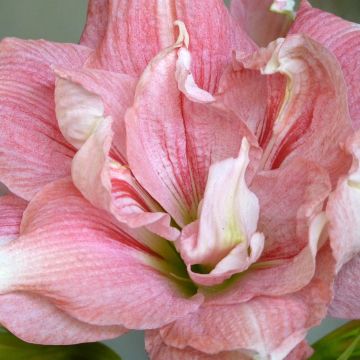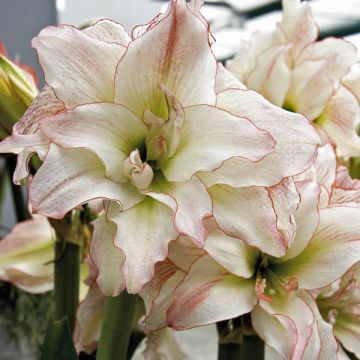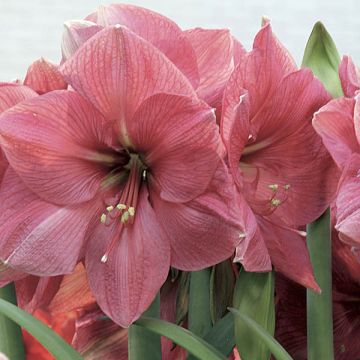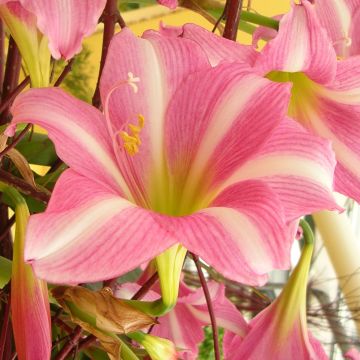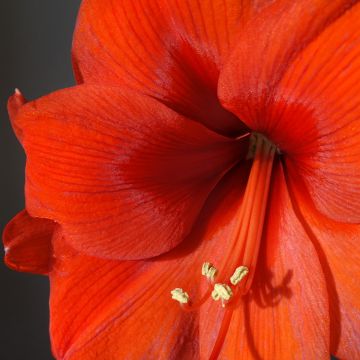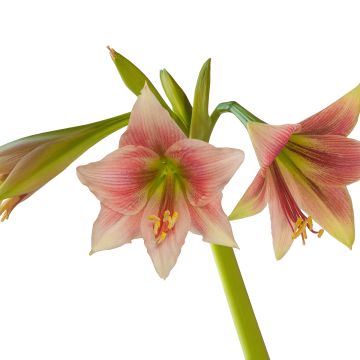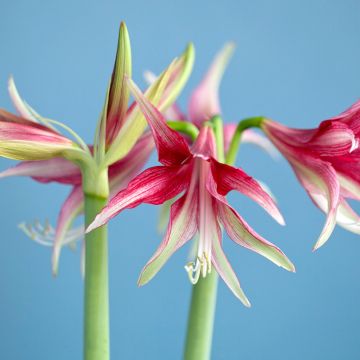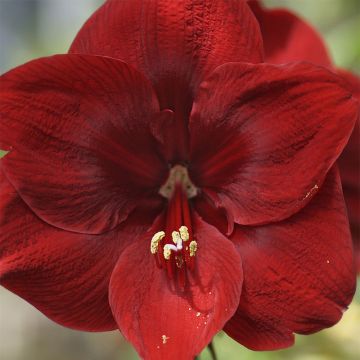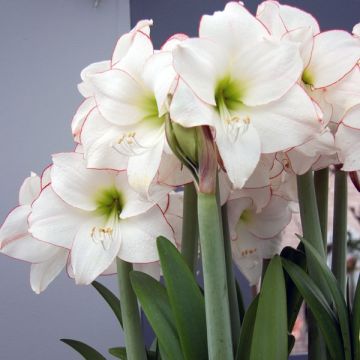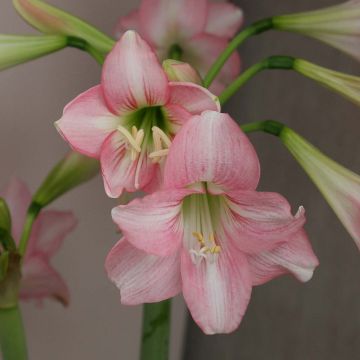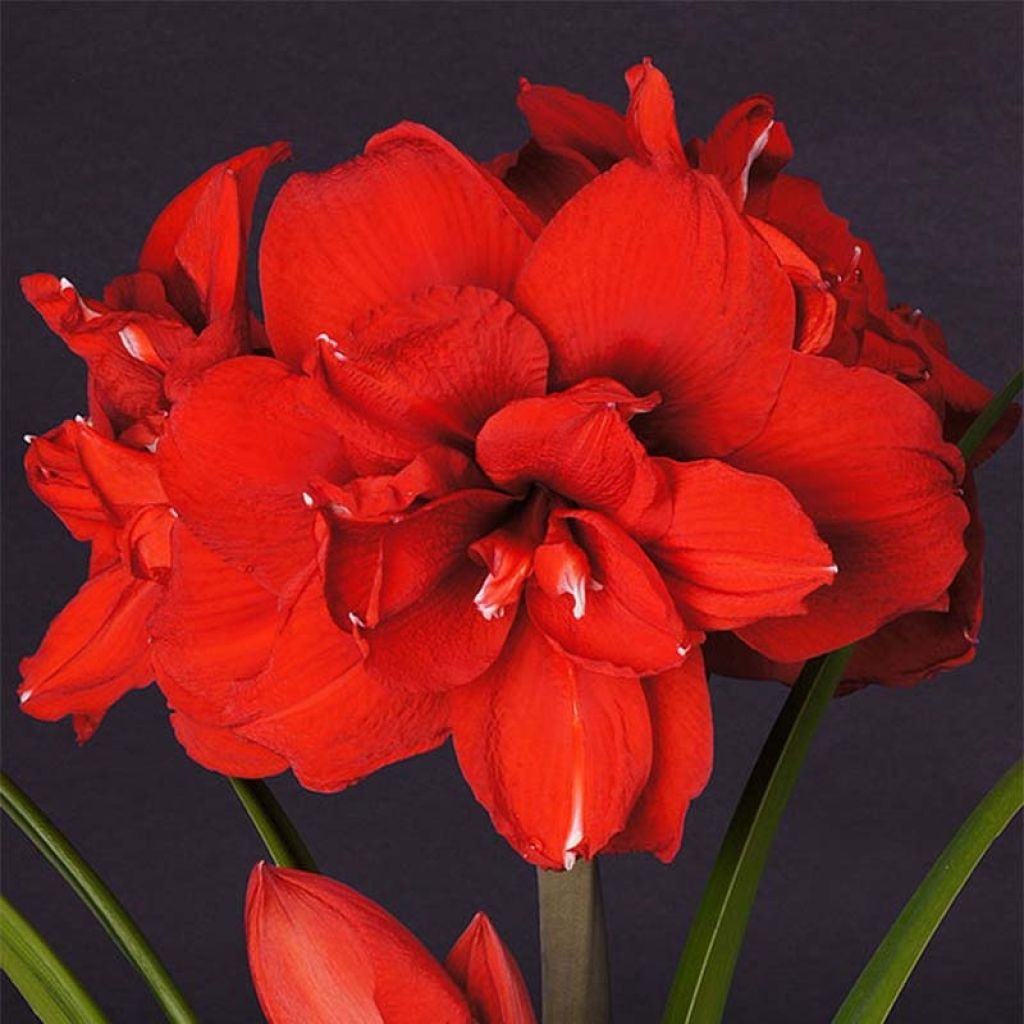

Amaryllis Double King - Hippeastrum
Hippeastrum Double King - Amaryllis
Hippeastrum Double King
Amaryllis, Knight's-star-lily
The amaryllis bulb arrived in very good condition and well protected. It produced numerous flowers of an intense red.
Michèle, 29/06/2022
This item cannot be shipped to the selected country
Delivery charge from €5.90
More information
Schedule delivery date,
and select date in basket
This plant carries a 6 months recovery warranty
More information
We guarantee the quality of our plants for a full growing cycle, and will replace at our expense any plant that fails to recover under normal climatic and planting conditions.
From €5.90 for pickup delivery and €6.90 for home delivery
Express home delivery from €8.90.
Does this plant fit my garden?
Set up your Plantfit profile →
Description
Hippeastrum 'Double King' is an impressive variety of amaryllis, with double flowers of deep vermillion red, delicately marked with white at the tips of the petals. Ideal for brightening up your interior at the end of the year, during a period when the garden is resting. In just a few weeks, this large bulb produces 1 or several robust stems, each carrying 4 enormous flowers. A simple regular supply of fertiliser will guarantee you faithful flowering every year.
Everyone knows amaryllis, but their scientific name is much less known: they belong to the genus Hippeastrum, in the Amaryllidaceae family. Speaking of amaryllis is a misuse of language, as there is another South African bulbous plant called, Amaryllis (not to be confused!). It can be grown outdoors but is not very hardy,
Hippeastrum are native to South and Central America and can only be grown indoors or in a greenhouse here, as they cannot tolerate any frost. Only the most sheltered gardens on the Mediterranean coast, spared from frost, will be able to accommodate them in open ground. They are characterised by a very large bulb that can reach 36cm (14in) in circumference, producing tall stems in the middle of winter (between December and February) that usually give rise to 3 or 4 flowers facing away.
The magnificent 'Double King' variety presents very large double flowers (up to 25cm (10in) in diameter) with elegant vermillion red petals, and an iridescent texture. The petals are often marked with a central line or a pure white tip, and the heart of the flower has petal-like stamens, transformed into small crumpled petals. The flowers are carried in groups of 4 on tall stems of 60cm (24in), arranged in a cross shape. The long bright green ribbon-like leaves dry up a few weeks after flowering.
The 'Double King' amaryllis is a subtropical plant. It should be placed in a warm location, always above 15°C (59°F) during flowering (a room that is too cold could cause the buds to drop). Water it a little during this period to prevent the substrate from drying out. Once flowering is over, cut off the dry stems. However, be careful not to remove the leaves until several weeks later, when they are completely dry. If you remove them while still green, the bulb will not be able to replenish its reserves properly and will not flower again.
Plant your amaryllis in a slightly larger pot than the bulb, burying it halfway, in rich and well-draining substrate. Moisture is its main enemy and can cause rot. These plants are very rewarding: the buds will begin to open between 6 and 8 weeks after planting. Start planting your bulbs in November to enjoy them during the holidays. Combine several varieties to stagger the flowering and enjoy them for a long period.
Report an error about the product description
Hippeastrum Double King - Amaryllis in pictures
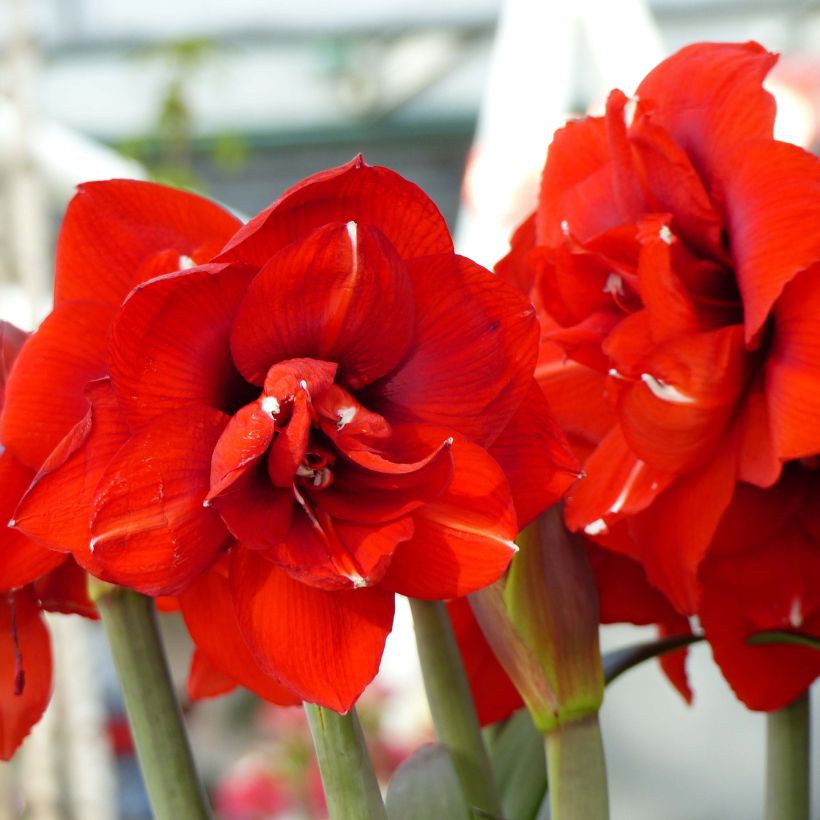

Plant habit
Flowering
Foliage
Botanical data
Hippeastrum
Double King
Amaryllidaceae
Amaryllis, Knight's-star-lily
Cultivar or hybrid
Other Hippeastrum - Amaryllis
Planting and care
You can plant amaryllis bulbs from October to the end of April. Choose a pot that is not too big (one or two cm larger than the size of the bulb). Place a layer of drainage at the bottom for proper water flow. Mix half potting soil, half garden soil. Only bury the bulb halfway. Place the pot in a warm and bright location. Water sparingly until the stem appears. Then water daily. Your bulbs will flower 6 to 8 weeks later.
If you choose multiple bulbs, plant them with a two-week interval to enjoy their beauty throughout winter.
After flowering, remove the faded flowers and let the leaves continue to grow. Continue to water regularly and give them indoor plant fertiliser every 15 days. This is when the bulb replenishes itself to prepare for next year's flowers. After 4 to 6 months, forget about your potted plants, and let them rest for about 3 months in a sheltered location. You can then trim the faded leaves, repot them in fresh soil, and start a new growing cycle.
Planting period
Intended location
Care
-
, onOrder confirmed
Reply from on Promesse de fleurs
Haven't found what you were looking for?
Hardiness is the lowest winter temperature a plant can endure without suffering serious damage or even dying. However, hardiness is affected by location (a sheltered area, such as a patio), protection (winter cover) and soil type (hardiness is improved by well-drained soil).

Photo Sharing Terms & Conditions
In order to encourage gardeners to interact and share their experiences, Promesse de fleurs offers various media enabling content to be uploaded onto its Site - in particular via the ‘Photo sharing’ module.
The User agrees to refrain from:
- Posting any content that is illegal, prejudicial, insulting, racist, inciteful to hatred, revisionist, contrary to public decency, that infringes on privacy or on the privacy rights of third parties, in particular the publicity rights of persons and goods, intellectual property rights, or the right to privacy.
- Submitting content on behalf of a third party;
- Impersonate the identity of a third party and/or publish any personal information about a third party;
In general, the User undertakes to refrain from any unethical behaviour.
All Content (in particular text, comments, files, images, photos, videos, creative works, etc.), which may be subject to property or intellectual property rights, image or other private rights, shall remain the property of the User, subject to the limited rights granted by the terms of the licence granted by Promesse de fleurs as stated below. Users are at liberty to publish or not to publish such Content on the Site, notably via the ‘Photo Sharing’ facility, and accept that this Content shall be made public and freely accessible, notably on the Internet.
Users further acknowledge, undertake to have ,and guarantee that they hold all necessary rights and permissions to publish such material on the Site, in particular with regard to the legislation in force pertaining to any privacy, property, intellectual property, image, or contractual rights, or rights of any other nature. By publishing such Content on the Site, Users acknowledge accepting full liability as publishers of the Content within the meaning of the law, and grant Promesse de fleurs, free of charge, an inclusive, worldwide licence for the said Content for the entire duration of its publication, including all reproduction, representation, up/downloading, displaying, performing, transmission, and storage rights.
Users also grant permission for their name to be linked to the Content and accept that this link may not always be made available.
By engaging in posting material, Users consent to their Content becoming automatically accessible on the Internet, in particular on other sites and/or blogs and/or web pages of the Promesse de fleurs site, including in particular social pages and the Promesse de fleurs catalogue.
Users may secure the removal of entrusted content free of charge by issuing a simple request via our contact form.
The flowering period indicated on our website applies to countries and regions located in USDA zone 8 (France, the United Kingdom, Ireland, the Netherlands, etc.)
It will vary according to where you live:
- In zones 9 to 10 (Italy, Spain, Greece, etc.), flowering will occur about 2 to 4 weeks earlier.
- In zones 6 to 7 (Germany, Poland, Slovenia, and lower mountainous regions), flowering will be delayed by 2 to 3 weeks.
- In zone 5 (Central Europe, Scandinavia), blooming will be delayed by 3 to 5 weeks.
In temperate climates, pruning of spring-flowering shrubs (forsythia, spireas, etc.) should be done just after flowering.
Pruning of summer-flowering shrubs (Indian Lilac, Perovskia, etc.) can be done in winter or spring.
In cold regions as well as with frost-sensitive plants, avoid pruning too early when severe frosts may still occur.
The planting period indicated on our website applies to countries and regions located in USDA zone 8 (France, United Kingdom, Ireland, Netherlands).
It will vary according to where you live:
- In Mediterranean zones (Marseille, Madrid, Milan, etc.), autumn and winter are the best planting periods.
- In continental zones (Strasbourg, Munich, Vienna, etc.), delay planting by 2 to 3 weeks in spring and bring it forward by 2 to 4 weeks in autumn.
- In mountainous regions (the Alps, Pyrenees, Carpathians, etc.), it is best to plant in late spring (May-June) or late summer (August-September).
The harvesting period indicated on our website applies to countries and regions in USDA zone 8 (France, England, Ireland, the Netherlands).
In colder areas (Scandinavia, Poland, Austria...) fruit and vegetable harvests are likely to be delayed by 3-4 weeks.
In warmer areas (Italy, Spain, Greece, etc.), harvesting will probably take place earlier, depending on weather conditions.
The sowing periods indicated on our website apply to countries and regions within USDA Zone 8 (France, UK, Ireland, Netherlands).
In colder areas (Scandinavia, Poland, Austria...), delay any outdoor sowing by 3-4 weeks, or sow under glass.
In warmer climes (Italy, Spain, Greece, etc.), bring outdoor sowing forward by a few weeks.

































